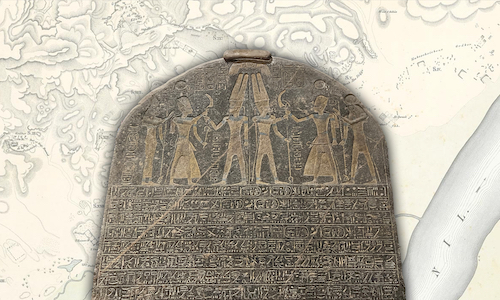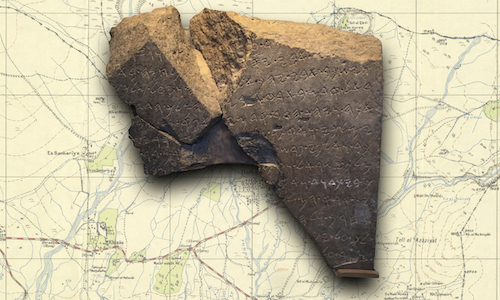The Biblical Dates of the Exodus
When someone inquiring about the views of a friend asked me, “…and when does he think the Exodus happened?”, I responded, “1446 BC.” “Good,” he nodded approvingly, “he believes what the Bible says.”
It was that conversation a few years ago that sparked an interest in the events surrounding the Israelite escape from Egypt and their settlement in Canaan. I’d known that people argued over when it took place, but I’d never encountered the date being used as a measure of whether someone “believes the what the Bible says” before.
It turns out that far from providing a single date for the Exodus, a number of quite different dates for the Israelites’ escape from Egypt can be found in the Bible. In this article we’ll work through the options and have a think about their implications.
The “Biblical” date
Those most confident about a specific date are those who hold to what is known as the Early Date, i.e. 1446 BCE. How do they arrive at that date? It’s pretty simple: you just read this passage:
1 Kings 6:1 In the four hundred eightieth year after the Israelites came out of the land of Egypt, in the fourth year of Solomon’s reign over Israel, in the month of Ziv, which is the second month, he began to build the house of the LORD.1
This verse tells us that whenever Solomon’s 4th regnal year was, 480 years before that is when the Exodus took place. Given that the traditional year for Solomon’s coronation is 970 BCE2, here’s the maths:
-970 + 4 (i.e. 4th regnal year) – 480 = 1446 BCE
There we go. Pretty simple, huh?
While you stick to this one verse, you can see why some are so confident in their belief that the biblical date of the Exodus was 1446 BCE. It’s also easy to understand why those who hold to this date think it’s the biblical date – no ‘gymnastics’ were required, we didn’t need to look up any other scripture, and we were able to take the 1 Kings passage at face value. The question of the date of the Exodus appears to have been definitively answered. There is no need for further investigation.
As my acquaintance implied, if you don’t believe the date of the Exodus is 1446 BCE, you don’t believe what the Bible says. In some circles the date has become a test of orthodoxy – if you accept the 1446 BCE date, you’re in; if you don’t, you’re out. Why? Because you’re not just accepting a date; you’re accepting an approach to the Bible.
However, unlike those who hold to the Early Date, we are going to investigate further.
Variations between the Hebrew Bible and the Old Greek
When those who hold to the Early Date quote 1 Kings 6:1, they invariably quote from a translation of the Masoretic Text; the Hebrew Bible behind the Old Testament in the bible on your lap.
What they usually aren’t aware of is that the Septuagint, an ancient Greek translation3 of the Hebrew bible (quoted frequently in the New Testament) that’s around 1,000 years older than the earliest manuscript of the Masoretic text we have doesn’t say 480 years; it says 440:
3 Kingdoms 6:1a And it came to pass in the four hundred and fortieth year after the departure of the children of Israel out of Egypt, in the fourth year and second month of the reign of Solomon over Israel…
Performing the same maths but this time with the Septuagint figure we get an Exodus date of 1406 BCE:
-970 + 4 – 440 = 1406 BCE
So, without leaving the verse we started with, we’ve already got a different “biblical” date. And it’s not like the difference between these dates is something insignificant like a year or two; it’s off by 40 years.
Sadly, very little has survived of the Dead Sea Scrolls copies of Kings (4Q54 and 5Q2) so we can’t look them up to see if they sided with either the Septuagint (440 years) or Masoretic (480 years) readings… or neither. However, what Dead Sea Scrolls we do have of Kings show many differences, demonstrating that in antiquity there wasn’t one fixed text of the book of Kings; there were a few and they varied in content.4 So, there’s no guarantee that before they disintegrated the Dead Sea Scrolls copies of Kings claim either 440 or 480 years.
So, which is the biblical date of the Exodus? 1446 or 1406 BCE? They’re both biblical!
Another option, this time from Paul
It turns out there’s another “biblical” date for the Exodus.
When the Apostle Paul was in Antioch in Pisidia, he went to the synagogue and gave a speech. Here’s an excerpt:
Ac 13:17–21 The God of this people Israel chose our ancestors and made the people great during their stay in the land of Egypt, and with uplifted arm he led them out of it. For about forty years he put up with them in the wilderness. After he had destroyed seven nations in the land of Canaan, he gave them their land as an inheritance for about four hundred fifty years. After that he gave them judges until the time of the prophet Samuel. Then they asked for a king; and God gave them Saul son of Kish, a man of the tribe of Benjamin, who reigned for forty years.
Adding up the chronological information Paul lists is easy enough:
| Event | Period |
|---|---|
| Wilderness wanderings | 40 years |
| Destroying 7 nations in Canaan | ? |
| Between destroying 7 nations and the judges | 450 years |
| Judges | ? |
| Saul5 | 40 years |
Given that David ruled for 40 years (2 Sa 5:4), here’s the maths6:
-970 + 4 years (Solomon’s 4th regnal year) – 40 years (David) – 40 years (Saul) – 450 years (whatever happened between destroying 7 nations in Canaan and the arrival of the Judges) – 40 years (wilderness) = 1536 BCE
So now we have three dates for the Exodus: 1406 BCE, 1446 BCE, and 1536 BCE; each as “biblical” as each other.
But wait, there’s more…
Adding up the narrative time periods
In his response to Bryant Wood entitled “What is the Biblical Date for the Exodus?”7, Hoffmeier produced a table of all the time periods mentioned between the day the Israelites left Egypt, and Solomon’s 4th regnal year. Granted, it doesn’t factor in co-regencies or potentially overlapping periods but it’s good enough to make the point. Here’s the table:
| Time period | Event | Reference |
|---|---|---|
| 3 years | Solomon’s 4th year | 1 Ki 6:1 |
| 40 years | David’s reign | 1 Ki 2:11 |
| 40 years | Saul’s reign | 1 Sa 13:1 |
| 30 years (est.) | Samuel’s leadership | 1 Sa 7:14-15 |
| 40 years | Eli’s judgeship | 1 Sa 4:18 |
| 20 years | Samson’s judgeship | Jdg 15:20 |
| 40 years | Philistine oppression | Jdg 13:1 |
| 8 years | Abdon’s judgeship | Jdg 12:14 |
| 10 years | Elon’s judgeship | Jdg 12:11 |
| 7 years | Ibzan’s judgeship | Jdg 12:9 |
| 6 years | Jephthah’s judgeship | Jdg 12:7 |
| 18 years | Ammonite oppression | Jdg 10:8 |
| 22 years | Jair’s judgeship | Jdg 10:3 |
| 23 years | Tola’s judgeship | Jdg 10:2 |
| 3 years | Abimelech’s rulership | Jdg 9:22 |
| 40 years | Gideon’s deliverance and peace | Jdg 8:28 |
| 7 years | Midian’s oppression | Jdg 6:1 |
| 40 years | Peace after Deborah and Barak’s victory | Jdg 5:31 |
| 20 years | Jabin’s oppression | Jdg 4:3 |
| 80 years | Ehud’s deliverance and peace | Jdg 3:30 |
| 18 years | Moabite oppression | Jdg 3:14 |
| 40 years | Peace after Othniel’s victory | Jdg 3:11 |
| 8 years | Mesopotamian oppression | Jdg 3:8 |
| 20 years (est.) | End of conquest to death of Joshua and the elders | Jdg 2:6–7 |
| 7 years (est.) | Joshua’s conquest until the tribal allotments | Jos 14:7-10 |
| 40 years | Time in the wilderness | Nu 14:33 |
| ~630 years |
More maths:
-970 + 4 years – 630 = 1596 BCE
Adding all the time periods mentioned between Egypt and Solomon’s reign gives a completely different “biblical” date for the Exodus – it’s not even close to the other “biblical” dates.
The Biblical Dates
We’ve collected a few dates; let’s put them in a table:
| Biblical Passage | Derived Biblical Date |
|---|---|
| 1 Kings 6:1 (LXX) | 1406 BCE |
| 1 Kings 6:1 (MT) | 1446 BCE |
| Acts 13:17-21 | 1536 BCE |
| Narratives | 1596 BCE |
With all of the above in mind, a few things should be obvious:
- Far from there being a single “biblical” date for the Exodus, we can extract from the Bible (at least) 4 different dates. And, by definition, each of them are “biblical”.
- The dates we can derive aren’t even close – it’s not like they’re all off by a year or two, there’s a spread of almost 200 years between the dates.
What are the implications?
- Scripture appears to be uninterested in chronological accuracy, therefore “biblical” dates should not be relied on when creating chronologies
- Face-value interpretation of chronological information in scripture may appear pious, but it’s actually a symptom of a hermeneutic that divorces scripture from reality and is therefore dangerous at best
- If we want to know what happened when, we need to turn to more accurate sources of information, in this case, archaeology
In a future post we’ll take a look at what the archaeological evidence tells us about the date of the Exodus. Spoiler: it’s not any of the dates we looked at. It’s not even close.
Further Reading
If you really want to know more, this is an excellent video on the topic:
Featured image
A photo I took from a minibus driving from Jebel Musa to Dahab.
Footnotes
-
Unless otherwise noted all scripture quotes are taken from New Revised Standard Version (Nashville: Thomas Nelson Publishers, 1989) ↩
-
For the details involved in establishing the dating of Solomon’s temple see Edwin R. Thiele, The Mysterious Numbers of the Hebrew Kings (Grand Rapids: Eerdmans, 1965), 51-53. ↩
-
I am aware this is an oversimplification. ↩
-
“Despite the limited scope of text on most fragments, however, there are enough indications of text significantly divergent from the traditional Masoretic Text to suggest that the text of Kings was pluriform in antiquity, just as the text of Samuel has been demonstrated to be.” Martin Abegg Jr., Peter Flint, and Eugene Ulrich, The Dead Sea Scrolls Bible: The Oldest Known Bible Translated for the First Time into English (New York: HarperOne, 1999), 1 Ki. ↩
-
Working out how long Saul reigned is no easy matter either – a story for another time. ↩
-
This sum excludes the unknown lengths of time that cover the destroying 7 nations in Canaan, and the time of the Judges – if we knew how long those periods were the date produced by this sum would be even earlier in time, expanding the range of “biblical” dates for the Exodus. ↩
-
James K. Hoffmeier, “What is the Biblical date for the Exodus? A response to Bryant Wood”, JETS 50/2 (June 2007) 225–47. ↩




